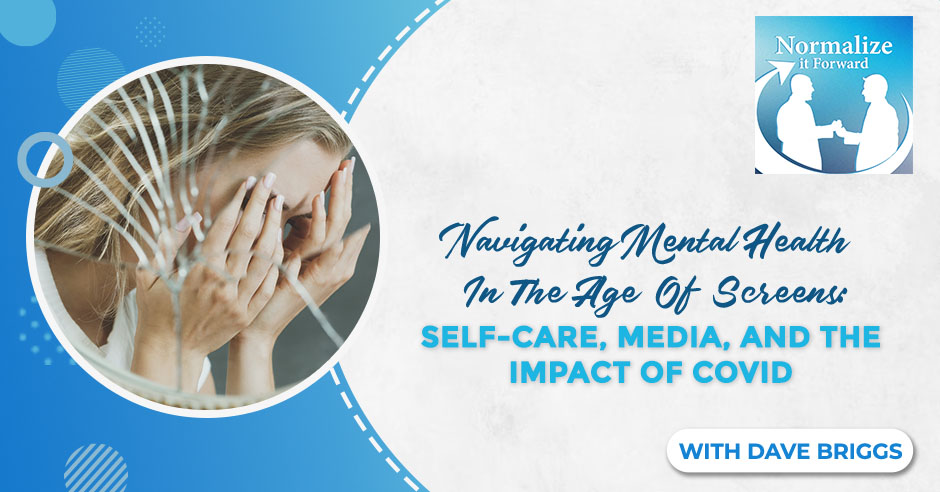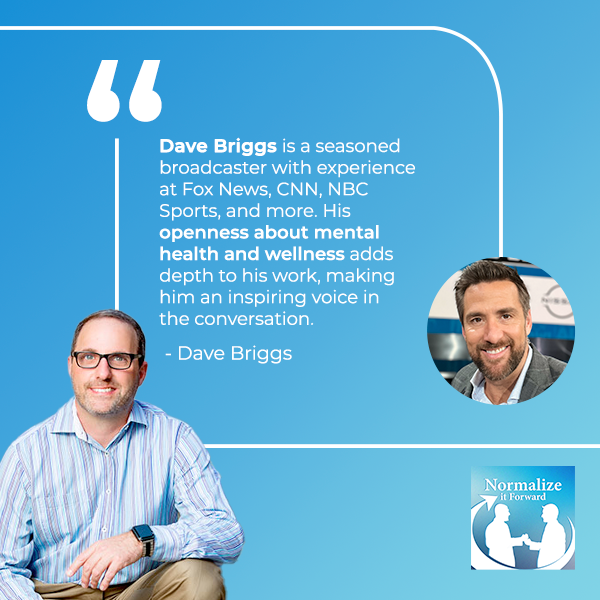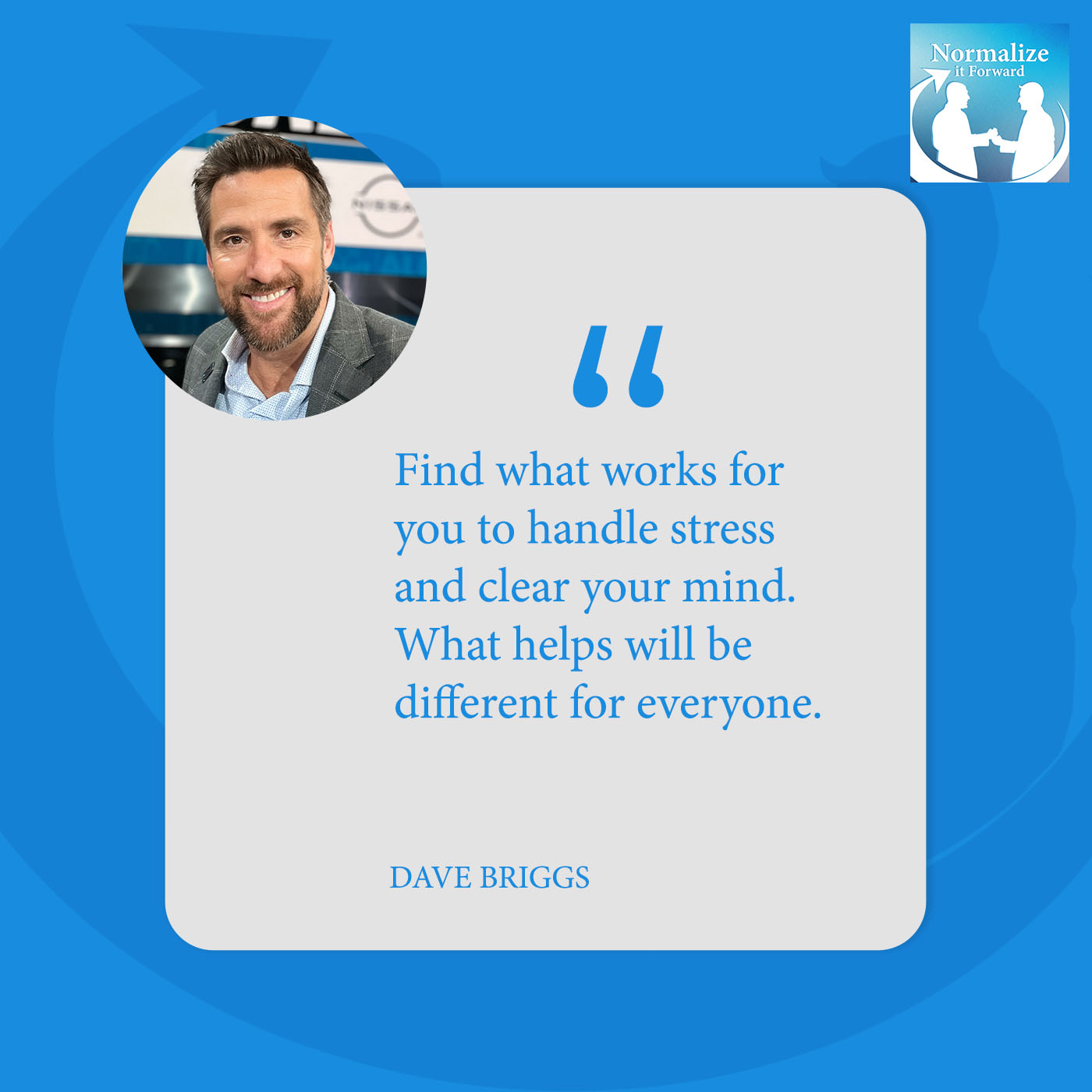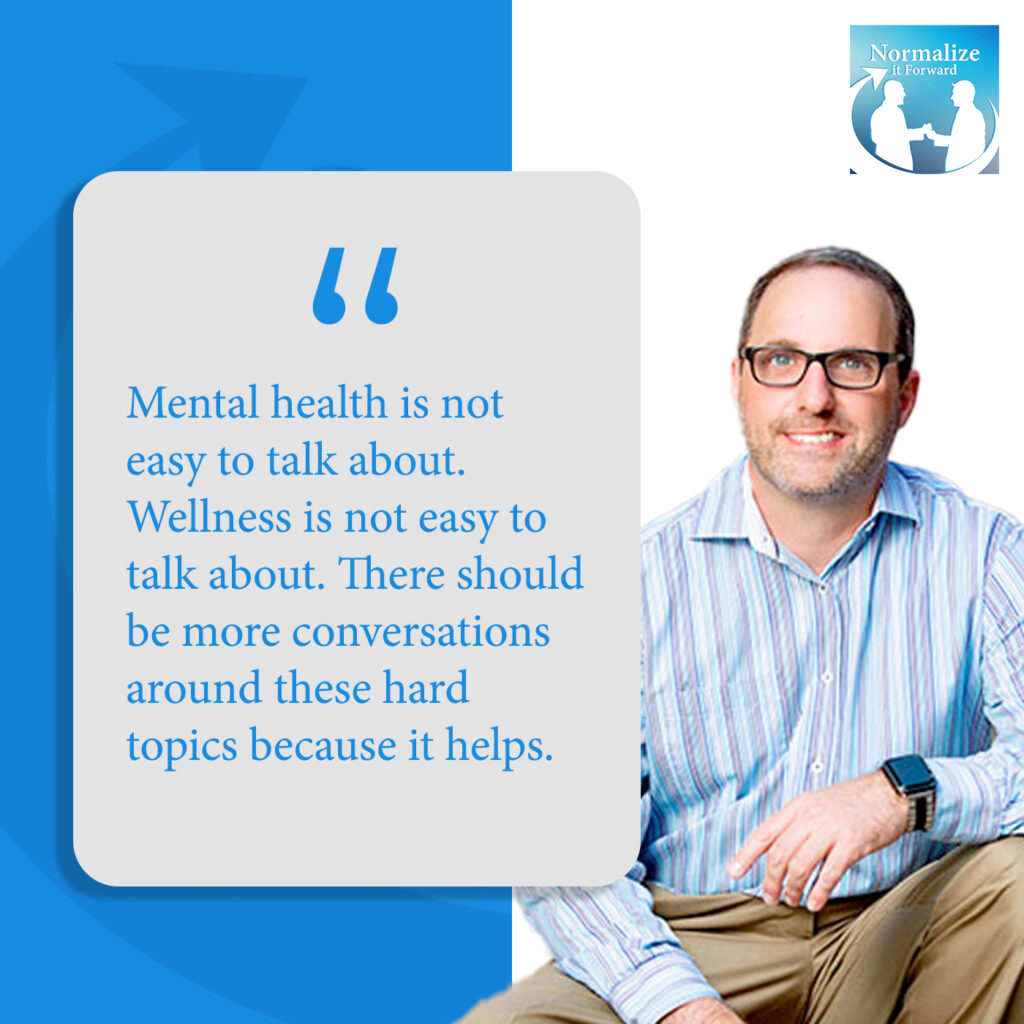
Dave Briggs, a seasoned national broadcaster, joins Normalize It Forward podcast to discuss his personal journey with mental health and wellness. In this candid conversation, Dave shares how he navigated anxiety and depression, emphasizing the importance of self-care and the role of therapy in his healing process. Tune in as Dave reflects on the evolution of mental health discussions, the impact of COVID-19 on our collective well-being, and the need for more accessible mental health resources.
—
Watch the episode here
Listen to the podcast here
Navigating Mental Health In The Age Of Screens: Dave Briggs On Self-Care, Media, And The Impact Of COVID
Welcome to Normalize It Forward, the show that openly talks about mental health and wellness. We are here with Dave Briggs. Dave, thank you for joining us. Dave is a long-time national broadcaster, having anchored at major networks including Fox News, CNN, NBC Sports, and Yahoo Sports. He has also played a news anchor on Season 4 of HBO’s Succession. He’s anchoring for Cheddar Business News at NYSE, and creating content wherever he can all around Connecticut. Dave, welcome.

Good to see you, my friend. It’s a pleasure being here. I often joke that I ran out of real networks so I started working at a fake one, ATN, on Succession but I think about every network I’ve worked at in some capacity.
I’ve seen lots of your work over time and certainly admire it for several reasons. You’re on the other end of the mic today but we’ll be talking about one of my favorite topics, mental health, and wellness. As you know, I’m a Family Therapist and work with young adults who head off to college. These days, the support that’s needed in young adults’ lives to manage their mental health and wellness is immense.
We’re living through a pretty difficult time for many. All the more reason we have these conversations and try to continue to have these conversations to be role models for our youth. Let me kick things off and ask this. Self-care is one of those topics. It’s a big topic within wellness that a lot of people talk about. I’m curious about your thoughts on what self-care means to Dave.
Self-Care And Its Importance In Mental Health
It has taken me about 47 years to begin to figure that out and I’m still not there. I had always employed various elements of self-care but never figured out that I needed all of the above and then some. I’ve always exercised and I thought that would be enough. A couple of years ago, I added meditation, journaling, and counseling. Therapy is a part of that journey.
What I realized is if I’m not doing all of the above at least 3 out of 4 or 5, I struggle. In particular, meditation and exercise, if I don’t do one of those things, I’m completely out of balance with my mental health. Certainly, therapy and journaling help. Those other things are complementary. If I’m not doing at least two plus of those things, everything is a mess. I’m learning a lot all the time about my mental health journey because I wish that I’d have understood what I had twenty years ago was anxiety.
I wish I had understood twenty years ago that I was prone to depression. Thankfully, my realization of those things early has helped me identify them in one of my kids. Honestly, in having those discussions, that child has helped me better understand some things about mental health and has taught me things that I didn’t know. It’s been quite a journey and one that honestly evolves every day. Sometimes you just fall apart.
Our kids are our best teachers. Life is a journey and we’re learning all the time. I’m glad that you brought up youth or young people. As you mentioned, a lot of young people in high school and college feel like they have it down. They’re getting okay rest. They’re getting some exercise here and there but they’re not forced to lean on self-care quite the way maybe adults are to manage things.
Sometimes for the first time, it’s in college for kids where they feel, “My stress level is overwhelming and something isn’t right here.” To your point, they have to find their own space. For some people, they love yoga and some people love meditation. Some people love car rides. Some people love therapy. Some people love journaling, and the list goes on.
There are so many different ways to take care. I learned over time as a therapist and as an individual that you have to pick some. They won’t just show up at your door. You have to go get them and figure out what you like and what works best for you on your journey. Self-care is an interesting topic. I find that the conversation around wellness can be uncomfortable for some. Mental health to me, the more I talk to people, the more I realize that everybody is susceptible. Everybody is dealing with things at varying levels. Some people are more open to it than others. What has been your experience as you’ve been out and about with people in public?
Honestly, I am surprised at how innate these things are or are not. I can see that. I pretty much see everything through the perspective of being a parent and that’s why I appreciate what you do and how you do it. For example, my eldest child, my eighteen-year-old daughter, it’s innate in her to have anxiety and to have a bit of depression. Unfortunately, she is exactly like her dad.
Whereas, my son who is sixteen is exactly like his mom. I can say right now, he will not know anxiety and depression and these things. I’m astonished at those things. You have little control over them. That has taken me a long time to realize that a lot of these problems are innate in us or they’re not. My wife is the first one to admit that it took her a long time to understand what I was going through because she always wakes up and is happy.
It’s hard for someone like that to understand someone like me who tends to wake up blue, who tends to see the dark side or focus on the negative, and it takes a lot of work to get to where she wakes up every day. That has been an interesting part of my mental health journey, and as a couple, realizing that we wake up in different worlds.
That’s amazing to me to see and it’s been difficult, but I suppose it helped me deal with a lot of other people. What I have noticed in recent years is that men talking about mental health has come 180 degrees in the last couple of years and that I am grateful for. I remember the day that I came out on Instagram that I was depressed. People couldn’t believe that a man, crying on Instagram and admitting it.
Men talking about mental health has literally turned 180 degrees in the last couple of years. Share on XA lot of mainstream television shows and athletes have normalized men dealing with mental health issues. Those two things have been instrumental. I don’t know if you watched Ted Lasso. That show dealt with mental health head-on with the signature main character, Coach Lasso and the Suits, which was on the USA, one of the longest surviving shows in the last 25 years. The main character, Harvey, dealt with mental health and straight-on had panic attacks. He was like the bastion of manhood. It’s a good time that mainstream media and our role models and athletes are beginning to normalize these conversations.
The Impact Of COVID On Mental Health And Social Media’s Role
I can’t agree more with you. It’s funny in some ways how it has taken us as men longer to be able to get to that place, but I’m glad we have in many cases because as human beings, we’re all susceptible. As you were talking earlier, some people are built in a way. Like allergies or anything else, we’re built in a way we’re more prone to depression. We are more prone to anxiety.
For those people to have to hide that and for those people to have to pretend on a day-in and day-out basis only makes their scenario ten times worse. I’m super thankful for people like you because I feel like when you have made more public conversation around things like mental health, that is something that has ripple effects. Let’s face it, social media gets seen by lots of people.
I think that kid sitting in their dorm room at nineteen years old feeling like they’re the only one on a college campus who’s depressed and overwhelmed sees some of that and can recognize that there are things that can be done. I constantly find myself saying, “You’re never alone.” There are people around. Some people will contact you, hound you, and be on you because they want to help. There are plenty of people out there who want to help. I’m curious because a lot of people talk about things like social media and things like COVID as game changers for mental health. How do you feel about the subject of mental health and wellness has changed since COVID?
The subject has come miles and miles in terms of being a mainstream discussion. The reason I’m wearing this T-shirt, which is Anger, the emotion from the Inside Out. I came from the movie Inside Out 2, the number one movie in America, which is all about our mental health and handling Anxiety, Joy, Sadness, Embarrassment, Envy, and Boredom.
That movie alone will change this conversation because it puts it in the mainstream. Families are seeing this movie together. Millions of people are seeing this movie and probably having mental health discussions before or after the film. I think that is helpful, but you asked about COVID. COVID was devastating for our mental health.
That seemed to be the root of my real mental health struggles. Part of that was losing a job during COVID, but it was that being at home, feeling depressed, and being stuck that started this in me. I’ve seen it in kids all over town, in particular here in Westport, Connecticut. COVID spiked mental health issues around the country.
In towns like this, it cuts back on socialization and development. It added screens to our lives. It increased the amount of time we all spend on screens and social media. On one hand, we’re in a much better place because of mainstream conversations like the Inside Out and the television shows I mentioned. On the other hand, I know that prescriptions for mental health medication have spiked.
COVID-19 spiked mental health issues around the country. It limited opportunities for socialization and development and increased our reliance on screens. Share on XOn one hand, you might say that’s great because we’re treating it. I think that’s a result of our mental health being in a much worse place than it was before COVID. That is sad because we’re short on competent mental health counselors, therapists, psychologists, and therapists like yourself. We’re desperately short. Things like BetterHelp are helping, but I don’t think we have nearly enough infrastructure to handle the mental health crisis that’s going on that the surgeon general talks about often.
The Pressure Of Mental Health On College Campuses
I tend to agree. Having talked to many college campuses in the last year imposed the concept that we need to change the way we look at this. It’s not just brick-and-mortar counseling centers that can be helpful to kids. You’ve got lots of adults on lots of campuses who can lend an ear, who can simply be a mentor, who can be a guide, or who can listen.
You see these things popping up that colleges are reaching for nowadays because they are desperate. They’ve got many kids walking around nowadays with their struggles. The word that no one wants to talk about is suicide. The suicide rate is way higher than most people realize in the last ten years. It’s climbed to the second spot for young people in terms of cause of death.
Nobody wants to talk about it because it’s an ugly word and it’s a horrible concept and an awful thing but it is a reality that is connected to this conversation of mental health and wellness. That to me is significant. Things like this movie you are referencing to me are fantastic because they bring the conversation around the basis of our emotions. Things that people don’t want to talk about but need to.
It’s okay to feel this way and it’s okay to feel that way because we’re all human beings. We could either ignore it and not talk about it. We could try to address it. I agree. Post-COVID, I feel like those numbers have all shot up in the wrong way in some cases. It puts some pressure on places like colleges and universities, and even counseling centers around the country to think about, “Are there ways we can do this differently so that we can help the general public better?” There are many more individuals struggling and not enough providers.
As someone who recently did the college visit tour with my daughter, who is going to the University of Chicago next year. We probably went to a dozen schools that we visited more than most. That gives you a good sample size for my next point, which is I can only remember one that emphasized mental health and mental health professionals, talking about it and mental health breaks in a building they had, and that was Yale.
Kudos to Yale. I know a lot of people have issues with how they’ve handled things over the last six months to a year regarding other issues. They wear it on their sleeve how they encounter mental health struggles head-on. They provide counseling. They provide help. They provide break space. The downside is that was the only school that I remember. These are high-pressure schools that my daughter is going into like in Chicago. We went to North Carolina, Harvard, and MIT. That was the only one that seemed to understand the mental health crisis that these types of high-performing students are undergoing right now. It’s a little scary that more schools aren’t doing more.
That’s significant. For our audience’s sake, recognizing that isn’t more part of the tour because lots of parents aren’t thinking about that. They’re thinking about how to design their dorm room, what majors they want, do they have access to a city, what computer to buy, and all that stuff, which is all important as well. However, when your child gets to school and if they have struggles and you haven’t investigated that as an option for them, they’re going to be stuck behind the eight ball.
Parents want to be thinking about that because as the numbers dictate, the statistics show us that there are lots of kids out there on college campuses with struggles. Dave, if you’re talking directly to a young person in college who’s starting to have symptoms of either depression or anxiety, what advice would you offer them?
Social Media And Its Detrimental Effects On Mental Health
A lot of them, first off, need to prepare for it well before that now, even if they’re happy or even if they’ve never dealt with it. I guess my advice would precede that because a lot of kids come from towns like this one, where it is a wonderful place to grow up. I’m thrilled that my kids got to grow up here. On the other hand, kids that did grow up here didn’t go through a lot of adversity because it is a wonderful upbringing in towns like Darien, Westport, Greenwich, Weston Wilton, you name it.
They’re going to deal with a lot of adversity that they’ve never seen or dealt with. They’re going to get, God forbid, a B-minus or a C on a report card. They’re going to deal with terrible social situations, not getting in the sorority they want to, not getting in the fraternity they want to. I know that’s not likely that students catch this message before they deal with anxiety and depression, but I hope they’re prepared for those moments and knowing that there are people to talk to.
Bring a toolbox to college, which is someone you can talk to, ideally a best friend, if not a therapist. Learn how to meditate now because that will help you deal with stress. Find a workout strategy and exercise. That doesn’t have to be going to the gym. I have a daughter who had never been to the gym before in her life until she joined two weeks ago and now has been every day since because she suddenly realized, “This is the best outlet for my stress and anxiety.” It doesn’t have to be the treadmill or weights. It might be going to Lake Mohegan and taking a walk because you hear the river, you smell the trees, you hear the birds, and you see dogs.
Find what works for you now so you know how to handle it then and things that clear your mind. That’s going to be something different for everyone. It might be meditation. It might be taking a walk. It might be going to the gym. Let’s hope that they don’t make having a drink part of that routine. I am guilty as charged but don’t think Mom and Dad are a great example that they come home from work and have a cocktail because that would be the worst road to go down as an eighteen-year-old kid.

Let’s face it. There are easy options. Kids find pot, kids find drinks, kids find this, and kids find that but to your point, it’s not going to resolve anything. It’s a temporary solution to a much larger issue. I appreciate your suggestions. You offer some good insight for young people to hear about. The takeaway in many cases is finding something that matches you, or finding something that works for you. If you haven’t found it with your first, second, or third choices, keep looking because there are options out there that will help.
I always use the word, willing. You have to be willing to try things and maybe leave your comfort zone to do it because you never know what club, activity, or things you try that exist. As corny as it may sound, go try it and see how it feels. If it feels good, keep doing it. It’s good for your mental health and your well-being. I’m curious to ask you about one other topic. Social media is a big topic for young people and older people. It has its benefits and has its drawbacks. I’m wondering your thoughts on that as associated with wellness.
The US Surgeon General, Vivek Murphy, said recently that it should come with a warning label. I strongly support that mission. I fear that it might not make as big a difference as we hope, but at the very least, it might make parents open their eyes. I see there’s a growing movement to ban phones in schools, which is a tremendous idea. New York and Los Angeles are going in that direction.
There’s a movement for parents to keep kids off of social media and off of smartphones until thirteen, which I also strongly support. This comes from someone who spends ten-plus hours a day on their phone, has three kids who are on their phones all the time, and has a twelve-year-old who has been on social media for a couple of years. “Pot calling the kettle black,” I understand that. Genie is out of the bottle.
I think we can get it back in. Social media is extraordinarily harmful to our kids. As a parent, I can say this, having seen it firsthand. It is much more serious a deal for daughters than it is for sons. Parents, you should know that. I am not being sexist. I have two daughters and I have one son. The pressure on young girls is 20X what it is with these young men.
Go look at what the boys can wear to school. Sweatpants, gross t-shirts, and these boys don’t even comb their hair. The girls are under so much pressure to be thin, look cute, and have those pictures match on Instagram. As long as you can keep your kids off of social media, please do it. You have to do this together. You have to talk to 4, 5, or 6 parents. The parents of your daughters or son’s friend. That’s the only way to do it because you cannot keep your kid off social media if they’re the only one. Don’t do that to them. That’s not fair.
As long as you can keep your kids off of social media, please do it. Share on XI probably shouldn’t elaborate, but I do have a kid who I believe Instagram caused an eating disorder. That was the leading factor. This cost parents their lives. I’m thankful it didn’t for us. This gets me a little emotional. We were on it. We were determined to stamp this out, get counseling every day, and talk to her. We never ignored this for one second. I quit a job that I was doing in another state because I knew we needed to be here and focus on this every minute of every day, but I don’t think parents have any idea how much harm it’s causing.
It’s destructive. You hit on two important pieces. The body image piece for females is immense. As you’re talking, I’m thinking this is a formula for anxiety for kids. It churns anxiety and makes kids feel less valued, which is crazy. It’s crazy that it has come to this but your message is important.
I’m hoping my audience can hear it and think about it. Dave, you hit on such an important topic, to band together with friends’ parents. If you do this with just your kid, you’re going to constantly hear about all of the other friends that they’re around and their availability on social media. Be wise and be smart. Times are changing for us as parents and for kids, and we have to stay up to date with that stuff and do what we can to protect our young ones.
I will add that I know you don’t want to snoop but believe me, you better snoop. I wish I had. You have to follow them and that’s part of the contract. If they don’t let you follow them, they’re not on it because you need to be looking at these comments. We were a little late in that regard, but I’ve talked to a lot of parents who have done that since learning from us and seen some of it before it became a problem. Read those comments, and see who’s following them and who they’re following. It’s part of the contract.
I don’t love that we’re on Life 360 and Find Me, Find My iPhone. We see where our kids are going every minute. Again, it’s part of the contract. We can’t put that genie back in the bottle. You got to snoop around a little bit. If anyone wants to talk to me about any of these things, I’m an open book. I will answer every DM on Instagram. That’s the best place to get me. I’m happy to talk to anyone about the mental health of our kids or pressures. I’m here.
I appreciate it, Dave. I know you’re a busy guy. I appreciate your honesty around this topic. Especially for men, this is a hard thing to talk about. Especially when it hits our kids, we’re protective of our kids and we want our kids to be happy. That’s all we want. We want them to be happy and safe. There are things we need to be doing.
As parents and as individuals, the reason I created Normalize It Forward is I want there to be more conversation around these hard topics. Mental health is not easy to talk about. Wellness is not easy to talk about, but it does help when we try to have a conversation and kids hear us talking about it. Kids hear us and recognize, “These parents understand that this is impacting us and this is big in our community amongst young adults.”

I appreciate your time and your energy around this, Dave. The other thing that I’ve been doing, I don’t want to put you on the spot here, but I’ve been asking people to nominate someone, a friend, a coworker, or a relative who you think would be helpful for me to interview in this particular area around mental health and wellness to continue and keep the conversation moving forward. Any thoughts? Any ideas?
I’ll put her on the spot because she is one of my favorite human beings in this space and has been a therapist at times for me. She’s an actress, Stephanie Shostak, who is probably very busy and tough to pin down but I will help you apply pressure to my friend Steph because her voice in this mental health conversation has been extraordinary.
Fantastic. That is the right person to nominate and keep this conversation going. Again, I appreciate your time and energy. Thank you very much. Have yourself a wonderful rest of the evening.
You’re the best. Thank you.
Take care. Bye, Dave
Important Links
- Dave Briggs – LinkedIn
About Dave Briggs
 Dave Briggs is a seasoned television host and journalist, known for his work across major news networks. He has co-anchored programs on CNN, NBC Sports, and Fox News, including co-hosting Fox & Friends Weekend. With a focus on sports, politics, and breaking news, Dave has built a diverse broadcasting career. He also served as a host for NBC’s coverage of the 2016 Rio Olympics. Beyond news, Dave is recognized for his engaging interviewing style and ability to cover a wide range of topics, from major sporting events to national political issues.
Dave Briggs is a seasoned television host and journalist, known for his work across major news networks. He has co-anchored programs on CNN, NBC Sports, and Fox News, including co-hosting Fox & Friends Weekend. With a focus on sports, politics, and breaking news, Dave has built a diverse broadcasting career. He also served as a host for NBC’s coverage of the 2016 Rio Olympics. Beyond news, Dave is recognized for his engaging interviewing style and ability to cover a wide range of topics, from major sporting events to national political issues.
